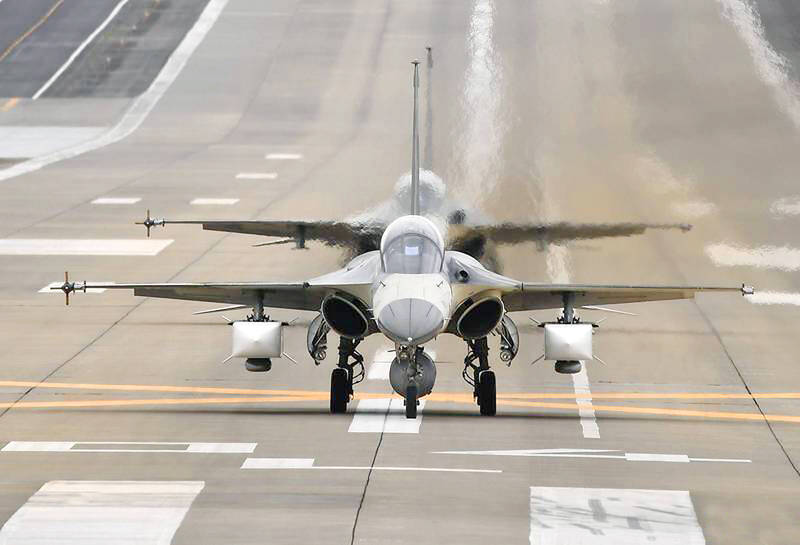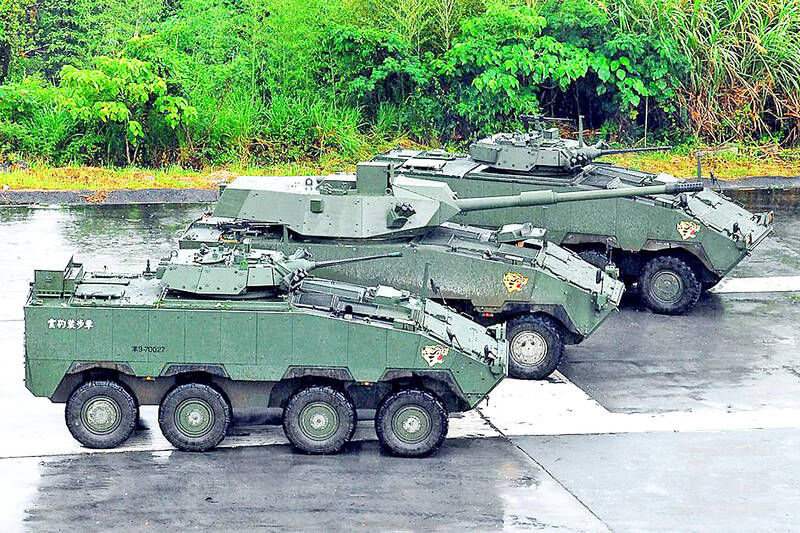The nation is on track to achieve a three-year plan to make 150 Wan Chien air-to-ground cruise missiles by the end of this year, a source familiar with the matter said yesterday.
The Wan Chien, a long-range precision-guided weapon utilized by the AIDC F-CK-1 Indigenous Defense Fighters, carries a payload of cluster munition for attacking troop concentrations and air bases, and has a claimed range of 200km, the source said on condition of anonymity.
According to the publicly listed portion of the Sea-Air Combat Power Improvement Plan, the Wan Chien missile production plan is budgeted at NT$370 million (US$11.82 million) to be implemented from 2022 to this year.

Photo: Taipei Times
That means total production would likely reach 150 missiles as the Chungshan Institute of Science and Technology has reported being able to make 50 missiles a year.
The nation would then have as many as 200 Wan Chien missiles since the Changshan Institute has previously been making the missiles under a general budget.
Additionally, the Ministry of National Defense has listed a NT$501.745 million budget for manufacturing Wan Chien missiles via a contractor, the source said.

Photo courtesy of the Military News Agency
This budget item most likely referred to an improved version of the Wan Chien that has a range of 400km, they said, adding that air force capabilities would get a significant boost if jets were to receive the extended-range missiles.
The 3rd Tactical Fighter Wing in Taichung and the 1st Tactical Fighter Wing in Tainan — the indigenous defense fighter air wings — have tested the missiles in live-fire drills and expressed satisfaction with the system, the source said.
Separately, the army’s Inspector of Armor has certified a locally produced 105mm rifled gun turret for a planned armored fighting vehicle to be based on the CM32, a defense official said on condition of anonymity.
The turret and its mounted gun demonstrated stability, precision and a hit probability superior to all active service armored fighting vehicles, including tanks, during live-fire trials conducted at the Armor Training Command, the official said.
A non-commissioned female officer — the best gunner to take part in the live-fire trials — had fired multiple shells through the same perforation on a target, the official said.
The Inspector of Armor has also given a score indicating satisfactory performance to the D1 and D2 prototypes for the vehicle that would receive the turret, with the exception that the hulls were 30cm taller than requested.
Meanwhile, a program to develop a 105mm-gun-armed wheeled armored fighting vehicle faces an uncertain future, as the army expects to receive M60A3 Patton and M1A2T Abrams battle tanks next year, they said.
The M60A3, though armed with the same gun, is better protected than the proposed wheeled vehicle, while the M1A2T, which sports a 120mm smooth bore gun and heavy composite armor, is markedly superior in both firepower and protection.
The Armaments Bureau and the 202 Arsenal are nevertheless working hard to roll out a complete 105mm-gun-armed vehicle as they believe the nation needs to have an indigenous ground warfare capability, the official said.

MORE VISITORS: The Tourism Administration said that it is seeing positive prospects in its efforts to expand the tourism market in North America and Europe Taiwan has been ranked as the cheapest place in the world to travel to this year, based on a list recommended by NerdWallet. The San Francisco-based personal finance company said that Taiwan topped the list of 16 nations it chose for budget travelers because US tourists do not need visas and travelers can easily have a good meal for less than US$10. A bus ride in Taipei costs just under US$0.50, while subway rides start at US$0.60, the firm said, adding that public transportation in Taiwan is easy to navigate. The firm also called Taiwan a “food lover’s paradise,” citing inexpensive breakfast stalls

TRADE: A mandatory declaration of origin for manufactured goods bound for the US is to take effect on May 7 to block China from exploiting Taiwan’s trade channels All products manufactured in Taiwan and exported to the US must include a signed declaration of origin starting on May 7, the Bureau of Foreign Trade announced yesterday. US President Donald Trump on April 2 imposed a 32 percent tariff on imports from Taiwan, but one week later announced a 90-day pause on its implementation. However, a universal 10 percent tariff was immediately applied to most imports from around the world. On April 12, the Trump administration further exempted computers, smartphones and semiconductors from the new tariffs. In response, President William Lai’s (賴清德) administration has introduced a series of countermeasures to support affected

CROSS-STRAIT: The vast majority of Taiwanese support maintaining the ‘status quo,’ while concern is rising about Beijing’s influence operations More than eight out of 10 Taiwanese reject Beijing’s “one country, two systems” framework for cross-strait relations, according to a survey released by the Mainland Affairs Council (MAC) on Thursday. The MAC’s latest quarterly survey found that 84.4 percent of respondents opposed Beijing’s “one country, two systems” formula for handling cross-strait relations — a figure consistent with past polling. Over the past three years, opposition to the framework has remained high, ranging from a low of 83.6 percent in April 2023 to a peak of 89.6 percent in April last year. In the most recent poll, 82.5 percent also rejected China’s

PLUGGING HOLES: The amendments would bring the legislation in line with systems found in other countries such as Japan and the US, Legislator Chen Kuan-ting said Democratic Progressive Party (DPP) Legislator Chen Kuan-ting (陳冠廷) has proposed amending national security legislation amid a spate of espionage cases. Potential gaps in security vetting procedures for personnel with access to sensitive information prompted him to propose the amendments, which would introduce changes to Article 14 of the Classified National Security Information Protection Act (國家機密保護法), Chen said yesterday. The proposal, which aims to enhance interagency vetting procedures and reduce the risk of classified information leaks, would establish a comprehensive security clearance system in Taiwan, he said. The amendment would require character and loyalty checks for civil servants and intelligence personnel prior to